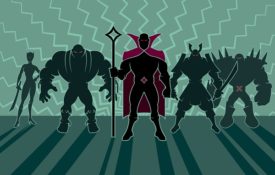-
‘A New Greatest Generation’: How Our Natural Resilience May Surprise Us
Anxiety, fear, and anguish are coursing through the world as we witness mounting numbers of sick people and deaths, frontline caregivers fighting for their patients’ lives with inadequate resources, and an unprecedented economic crisis that’s touching everyone and shattering the livelihoods of many. We’re all feeling it to some degree, and for those most directly and traumatically affected, the mental and emotional consequences will be severe and long-lasting, psychologists fear. ... People tend to be as resilient as they need to be, says Thomas Rodebaugh, PhD, director of clinical training in the Department of Psychological and Brain Sciences at Washington University in St. Louis.
-
When Older Relatives Shrug at Coronavirus Restrictions
I went hoarse shouting at my mother last week. “You really got into your building elevator with someone else?” She blamed the other person for standing in the middle of the elevator; I blamed her for getting in, putting herself at risk of catching the coronavirus. By the time my 88-year-old father got to the phone, I remembered the researcher Brené Brown’s theory that vulnerability opens all doors. I would move my father by sharing my deepest fear. I told him I loved him. I said the thought of losing him was devastating. I asked him, “Dad, are you afraid?” He laughed. “What’s to be afraid of?
-
Quarantine Survival Tips for Extroverts and Perfectionists — And Those Who Live With Them
Many of the memes that started after the country began social distancing involved distraught extroverts and contented introverts. Consider the Instagram image of actress Zoë Kravitz eating and drinking in the bathtub with a caption that reads, “People: I’m going crazy in quarantine. Me: Living my best life.”There’s truth to the jokes, but for some, it’s not a joking matter. People with certain psychological characteristics are more vulnerable than others to the effects of staying at home during the coronavirus pandemic. Also, what works best for one personality type might not be helpful to another.
-
This is How COVID-19 Could Change the World of Work for Good
Around half of the world's population is on lockdown in an attempt to stop the spread of COVID-19, a public health emergency that has claimed thousands of lives and sparked fears of the worst global recession since the Great Depression. This has had a profound impact on the world of work, as well as our mental and physical well-being. While nobody would choose to go through this crisis, social scientists, management professors and psychologists around the world are watching closely, keen to investigate the effects of this enforced global experiment.
-

Science Says We Prefer Fictional Villains Who Remind Us of Ourselves: Interview with author Rebecca Krause
People may find fictional villains surprisingly likeable when they share similarities with the viewer or reader.
-
The Perks of Being a Weirdo
My childhood was, by most definitions, pretty strange. I grew up a Russian Jewish immigrant in Midland, Texas, in a region whose biggest claims to fame are being the onetime home of George W. Bush and the inspiration for Friday Night Lights. In preschool, I got in trouble for not praying before eating my snack; later, I didn’t know what this “Super Bowl” everyone kept talking about was. I felt hopelessly different from everyone else in our town. Even after we moved to a Dallas suburb, I never encountered another Russian immigrant kid like me. I rode the bus alone. I spent almost every evening alone. I began talking to myself—a habit that has unfortunately stuck.

